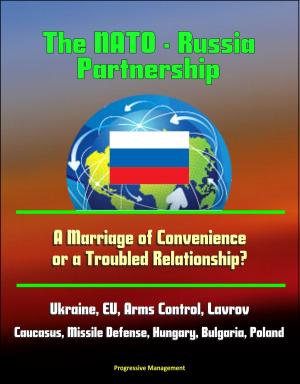Russia, the United States, and the Caucasus; The Security Concerns of the Baltic States as NATO Allies: Estonia, Latvia, Dagestan, Armenia, Chechen, Nagorno Karabakh, U.S. - Russian Reset
Nonfiction, History, Baltic States, Asian, Russia| Author: | Progressive Management | ISBN: | 9781310312106 |
| Publisher: | Progressive Management | Publication: | March 18, 2014 |
| Imprint: | Smashwords Edition | Language: | English |
| Author: | Progressive Management |
| ISBN: | 9781310312106 |
| Publisher: | Progressive Management |
| Publication: | March 18, 2014 |
| Imprint: | Smashwords Edition |
| Language: | English |
While the Soviet Union is gone, the people who led the Communist Party and controlled fearsome institutions such as the Soviet Secret Police (KGB) are still very much with us. The ugly history of the Soviet Union and its treatment of conquered nations is still a very recent memory, and the statements and actions of the current Russian leadership do not provide evidence that the old ways of thinking have died.
Russia, the United States, and the Caucasus - In the post-Soviet period, the Caucasus region has been a source of chronic instability and conflict: Unresolved "frozen conflicts" in Abkhazia, Southern Ossetia, and Nagorno Karabakh; continuing armed resistance in secessionist Chechnya and associated Islamic radicalism; the "Rose Revolution" in Georgia and Tbilisi's subsequent efforts to realign with the West; competition for access to the oil and natural gas reserves of the Caspian basin—these kinds of factors and more have ensured that the region would become and remain a source of significant international engagement and concern. Professor R. Craig Nation's monograph highlights the kind of conflicting interests that have made Russian-American relations in the region highly competitive. But he also addresses areas of shared priorities and mutual advantage that provide a potential foundation for more benign engagement that can work to contain conflict and head off further regional disintegration. However they are resolved, regional issues emerging from the Caucasus will have a significant impact upon the larger climate of U.S.-Russian relations in the years to come.
The Security Concerns of the Baltic States as NATO Allies - The end of the Cold War in the early-1990s signified a huge and very positive transformation in world politics. Nations that had been Warsaw Pact enemies for 5 decades became, almost overnight, allies of the West. Even nations that had been republics of the Soviet Union—the best examples being Estonia, Latvia, and Lithuania — moved immediately to become staunch Western allies. The full post-Cold War transformation was consummated in 2004 when the three formerly Soviet Baltic republics, along with some former Warsaw Pact nations, became new members of the North Atlantic Treaty Organization (NATO). The admission of former Warsaw Pact nations such as Poland, the Czech Republic, Hungary, and the Baltic States into NATO has changed the dynamics of the Western alliance in ways that most of the Western leaders, especially those from the "Old Europe" nations, still do not fully grasp. The new NATO members tend to look much more to the United States than to European NATO members for leadership in all security matters. While the Baltic States tend to be enthusiastic European Union (EU) members in matters of economics, in matters concerning security, they tend to look first to the United States. The new NATO nations take security very seriously. Poland has one of the largest and best-trained armed forces in NATO. The former Warsaw Pact countries are ready and willing to have radar stations and anti-missile defenses on their national territory. Taking security seriously, along with a willingness to participate in out-of-area operations, has won the new NATO nations and the Baltic States respect in the NATO and Western councils. The new NATO nations also bring perspectives to the Atlantic alliance that tend to shake the complacency of the older member states. For example, the Baltic States in particular see the current Russian regime and Russian behavior in a much less benign light than the political leadership in the United States or older NATO nations do. The Eastern Europeans do not see evidence of any "reset" in relations with Russia and instead can point to many specific actions of the Russian Federation's government that demonstrate a clear hostility to NATO and Western interests.
While the Soviet Union is gone, the people who led the Communist Party and controlled fearsome institutions such as the Soviet Secret Police (KGB) are still very much with us. The ugly history of the Soviet Union and its treatment of conquered nations is still a very recent memory, and the statements and actions of the current Russian leadership do not provide evidence that the old ways of thinking have died.
Russia, the United States, and the Caucasus - In the post-Soviet period, the Caucasus region has been a source of chronic instability and conflict: Unresolved "frozen conflicts" in Abkhazia, Southern Ossetia, and Nagorno Karabakh; continuing armed resistance in secessionist Chechnya and associated Islamic radicalism; the "Rose Revolution" in Georgia and Tbilisi's subsequent efforts to realign with the West; competition for access to the oil and natural gas reserves of the Caspian basin—these kinds of factors and more have ensured that the region would become and remain a source of significant international engagement and concern. Professor R. Craig Nation's monograph highlights the kind of conflicting interests that have made Russian-American relations in the region highly competitive. But he also addresses areas of shared priorities and mutual advantage that provide a potential foundation for more benign engagement that can work to contain conflict and head off further regional disintegration. However they are resolved, regional issues emerging from the Caucasus will have a significant impact upon the larger climate of U.S.-Russian relations in the years to come.
The Security Concerns of the Baltic States as NATO Allies - The end of the Cold War in the early-1990s signified a huge and very positive transformation in world politics. Nations that had been Warsaw Pact enemies for 5 decades became, almost overnight, allies of the West. Even nations that had been republics of the Soviet Union—the best examples being Estonia, Latvia, and Lithuania — moved immediately to become staunch Western allies. The full post-Cold War transformation was consummated in 2004 when the three formerly Soviet Baltic republics, along with some former Warsaw Pact nations, became new members of the North Atlantic Treaty Organization (NATO). The admission of former Warsaw Pact nations such as Poland, the Czech Republic, Hungary, and the Baltic States into NATO has changed the dynamics of the Western alliance in ways that most of the Western leaders, especially those from the "Old Europe" nations, still do not fully grasp. The new NATO members tend to look much more to the United States than to European NATO members for leadership in all security matters. While the Baltic States tend to be enthusiastic European Union (EU) members in matters of economics, in matters concerning security, they tend to look first to the United States. The new NATO nations take security very seriously. Poland has one of the largest and best-trained armed forces in NATO. The former Warsaw Pact countries are ready and willing to have radar stations and anti-missile defenses on their national territory. Taking security seriously, along with a willingness to participate in out-of-area operations, has won the new NATO nations and the Baltic States respect in the NATO and Western councils. The new NATO nations also bring perspectives to the Atlantic alliance that tend to shake the complacency of the older member states. For example, the Baltic States in particular see the current Russian regime and Russian behavior in a much less benign light than the political leadership in the United States or older NATO nations do. The Eastern Europeans do not see evidence of any "reset" in relations with Russia and instead can point to many specific actions of the Russian Federation's government that demonstrate a clear hostility to NATO and Western interests.















